Interpretive, Interpersonal, and Presentational Modes of Communication
Exploring Culture
Through this class I had opportunities to learn about and explore a variety of Spanish-speaking cultures. Among those opportunities were Talkabroads, projects, Immerseme lessons, and discussion boards. I found that some of the most rewarding were the Talkabroads I did, as it allowed me to speak with a person from one of those Spanish-speaking countries directly. Below is one of the mentioned Talkabroad conversations, focused on influencers and customs.
This conversation in particular resonated with me, and I remember being struck by how similar my partner and I’s cultures were, even though we live in two different countries and have different mother tongues. Despite our different cultures, we shared a lot of similar ideas, beliefs, and life experiences. Through our interactions, I realized that while we have many different customs, a large part of both of our cultures is the same as well. It made me start thinking about how little I truly know about other countries and how other countries are portrayed in US media for me to have not realized these similarities before.
Engaging in Communities
It’s of great importance to engage with and learn about different cultures and communities. Without these interactions it would be very difficult to understand each other, and without sharing aspects of our cultures we would retain narrow views and be unable to experience other peoples’ realities. Below is a poem by J. F. Seary titled “Nuyorican Tales” about their culture which is a unique mix of Puerto Rican and New York culture.
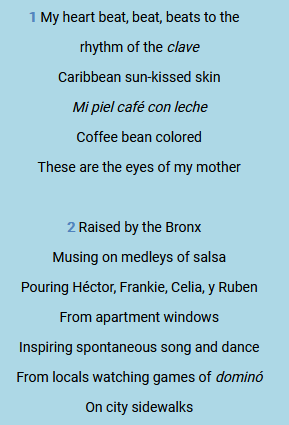
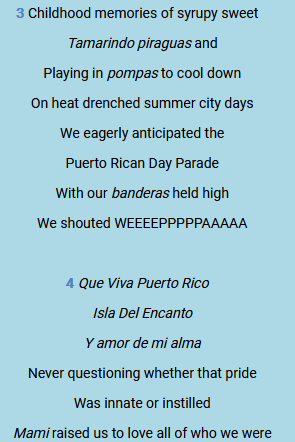
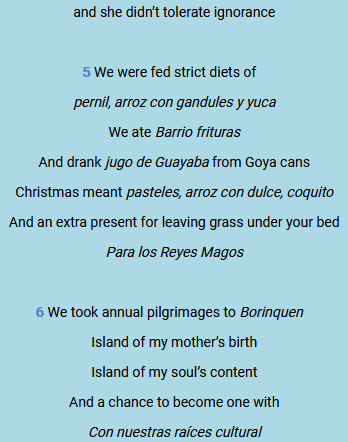
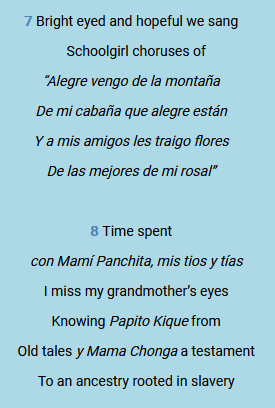
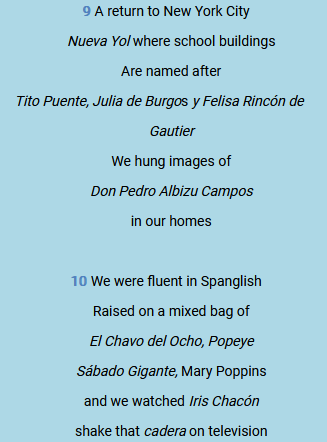
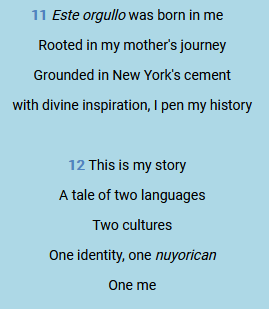
Without reading this poem, there are many aspects of the author’s life and culture that I would never have known otherwise. Consuming different media and experiencing different cultures firsthand allows me knowledge and understanding of different people that wouldn’t exist had I not reached out for it first. Opportunities like the one given for me to read “Nuyorican Tales” offer me a glimpse into these unique communities which I would one day like to experience more personally.
Interpersonal Communication
In this class we were assigned a variety of interpersonal assignments including Talkabroads, Flipgrids, and discussion boards. Of these, the most striking ones were the Talkabroads, as they allowed me the opportunity to speak with a native Spanish speaker, while both Flipgrids and discussion boards were confined between my classmates and I. Below is the first of two Talkabroad conversations I completed this semester, focused around stereotypes and the concept of identity.
Through each assignment I completed I got more used to using Spanish in both writing and conversational situations. A lot of the difficulties I faced had to do with remembering and using vocabulary in the moment. These assignments have helped me get more used to using Spanish and therefore be able to recall the words I want to use quicker. In conversation I worked around words I couldn’t remember by sometimes using hand gestures or saying a set of words with similar enough meaning that my partner could understand what I meant. Some of the words I had trouble with, though, had to do more with everyday small talk, such as weather, like not remembering the word for “rain” and instead saying “snow”. It reminded me to pay more attention to more mundane, everyday vocabulary.
Presentational Speaking
Most of the presentational speaking I did was in the form of video projects in which I memorized about three minutes worth of script written in Spanish and performed it as naturally and fluently as possible without reading it. The example below is a presentational video project I made where I spoke about food deserts in the United States and explained not only their circumstances, but what I believed should be done to help.
The biggest challenge I had with these projects was memorizing the script well; three minutes is a surprisingly long amount of time. By reading over my scripts many times and practicing them aloud I was able to not only familiarize myself with speaking naturally, but practice using Spanish and working on my pronunciation of words. Next time I would put much more effort into pronunciation than I did previously because some Spanish words sound very similarly.
Presentational Writing
Through this semester I wrote many things including a series of short essays for projects or exams. One example is below, focusing on examining a poem titled “My Name” by Yesika Salgado. It was part of a two-part project in which I also recorded myself performing the poem.
“Este poema es titulado “My Name” de Yesika Salgado. Lo habla sobre las experiencias de la narradora con gente no hablan su nombre correctamente, y se pregunta por qué tiene ser ella quien diga “lo siento”. El poema relaciona a la identidad hispaña de la narradora y usa las metáforas y los imágenes describir la relación complicada ella tiene con su identidad. Lo usa el descripción de un niño quien no quiere llamar su nombre introducar cómo ella ve su herencia como socialmente indeseable y mal.
La structura del poema es interesante. Solo hay dos párrafos, uno baja y uno muy largo. Algunos líneas en el párrafo muy largo son muy baja, solamente dos palabras y todo eso son mucho largo. El poema enfatiza algunos líneas, por ejemplo que su padre la llamaba: “Mi corazon / Mi amor / Mi vida”. Solamente poco comas son en las líneas y solo uno signo de interrogación en la línea: “But why?”. Estructuralmente, son otros preguntas en el poema que solo no tienen signos de interrogación al final, pero la inclusión de el signo de interrogación aquí se siente como todo el poema fue escrito solo para esta pregunta que expresa su confusión sobre de por qué necesita decir “lo siento” porque otros pronuncian mal su nombre.
A mi, esto poema siente enojado y frustrado. La narradora parece estar quejándose de la situación y de cómo empezó a sentirse incómoda con su propia cultura cuando debería ser su casa. Las últimas cuatro líneas, “When my name was the only thing that was given to me / Without the expectation of something in return / If We can’t go into every conversation demanding to speak Spanish / Then we can go in demanding that our names sound like the language we first learned to love” se sienten como la narradora finalmente aceptara su cultura sin sentirse mal y se enojó y desafió las expectativas sociales que excluyen la cultura hispaña y latine de la cultura popular.”
During this class I have become much more proficient at writing in longer, more complex sentences thanks to now having more knowledge of vocabulary and grammar. I have specifically gotten better at and more used to using several tenses such as the subjunctive and past tenses such as the imperfect and the preterite. I have historically struggled with using certain grammar functions correctly, such as the various forms of “se” verbs, which I am in the midst of overcoming as opposed to having already overcome them. On the other hand, I have excelled at using a variety of words in my writing to express my ideas as clearly as possible, and also combining parts of the phrases together to express a word or phrase that was not specifically in the vocabulary I was given.
Interpretive Listening
As part of the curriculum, I listened, analyzed, and responded to a variety of videos and audios. One video was part of LingroLearning Unit 17 about understanding stereotypes, and was a short series of street interviews in Mexico City, Mexico asking the locals how they see themselves.
Among the things I listened to over the course of the semester were video recordings, Immerseme lessons, Talkabroads, and Flipgrids by other students, to name a few. Almost all of them I was meant to respond to and thoroughly understand. Some of the challenges I faced had to do with understanding what was being said quickly and without aid, as some instances, including the audio above, featured Spanish spoken unclearly or in accents I was unused to. As the semester went on, I naturally found myself better able to understand what was being said because I gained much more exposure to spoken Spanish. Something I found the most compelling was somewhat indirect, as it was the feeling of satisfaction I got from being able to clearly understand what I heard which inspired me to listen to even more spoken Spanish. I feel as though my listening and comprehending skills have gotten much better.
Interpretive Reading
As part of LingroLearning Unit 19, there was an excerpt from Francisco Jiménez’s autobiography “Más allá de mí”, a section titled “Viaje a la universidad” where he details his arrival to the American university he was accepted to.
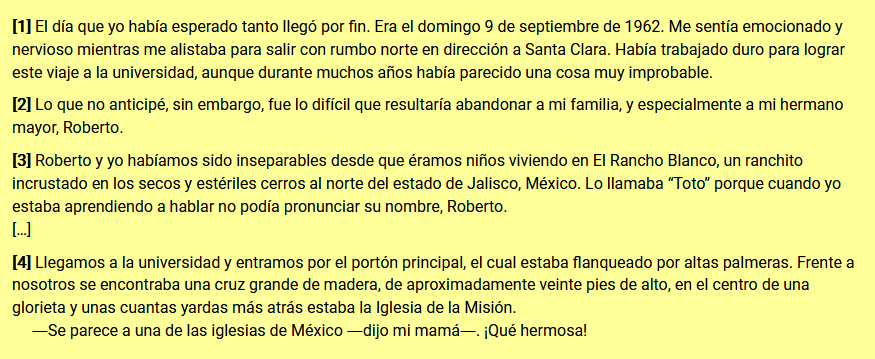
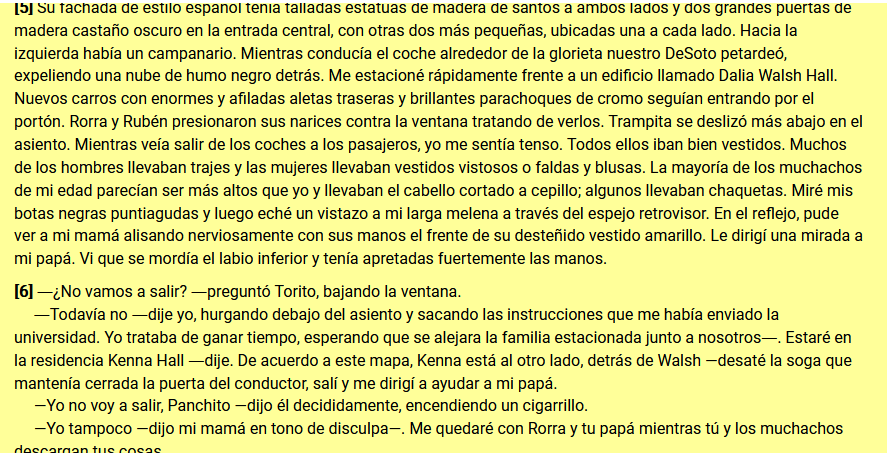
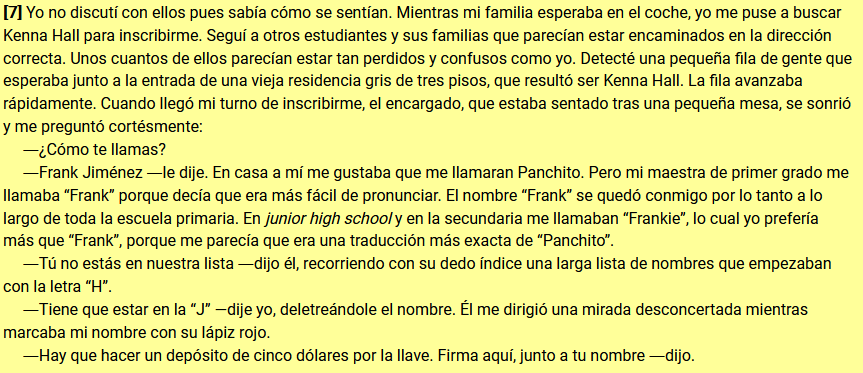
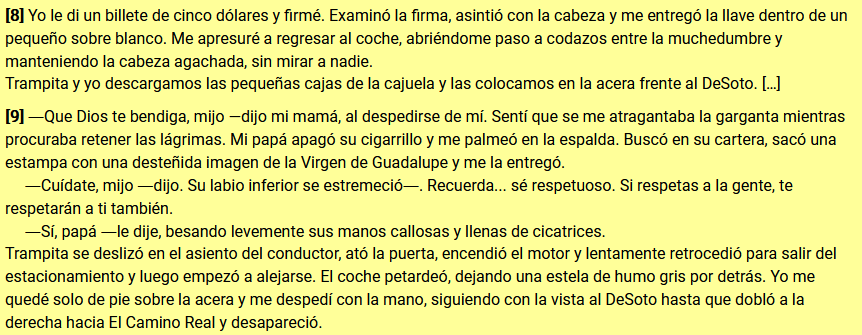
This reading in particular was quite challenging for me. The vocabulary given to us for this unit revolved around this excerpt, but even with that there were many words I still did not recognize. To overcome this I had to read the excerpt over very carefully, and use as much context as I could to come up with an approximate meaning. I found it interesting to know that this is how Spanish authors write, since this is from a real autobiography and I rarely have contact with extensive Spanish writing that was not created for the sake of an assignment. With this reading I became better able to read Spanish fluently and quickly. It made me develop a sense of empathy for the author when I finally completely understood what he meant when he wrote this section.